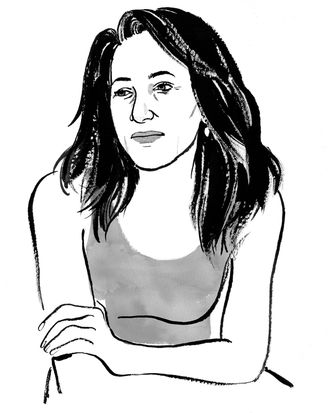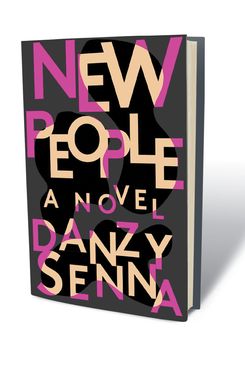
“When you are writing a novel, you are always trying to submerge yourself in a dream state, and New York was constantly waking me up from that state,” says Danzy Senna. She’s sitting outdoors at a shady café in South Pasadena, California, roughly 2,400 miles from Brooklyn, where she once lived and from which she drew inspiration for her propulsive new novel, New People.
South Pasadena, the sweet and sleepy town where we both currently reside, is not Brooklyn — it’s more like a Southern California hallucination of Mayberry. Its leafy streets and Craftsman houses regularly stand in for a middle-American idyll in movies, TV shows, and commercials. (The swaying palm trees reliably get cropped out of the frame.) Suburban L.A.’s low-stimulus environment has proved far more conducive to Senna’s writing than the boho hyperactivity of New York. Senna is the 46-year-old author of five books, including her celebrated 1998 debut novel, Caucasia, and all of her work explores the nuances of being mixed race in America with stinging humor and acuity. But, in some ways, “the central identity conflict in my life has been New York versus L.A.,” she says. “I became an author in New York, but it was like a book party that never ended. I became someone who had written something once. In Brooklyn, I’d walk out my door and bump into someone at seven in the morning at the dog park who would tell me about their six-figure book advance.” Los Angeles, by comparison, she jokes, is “so boring that your imagination becomes your life.”
Senna is the child of two writers — poet and novelist Fanny Howe, who is Irish-American, and Afro-Mexican editor and academic Carl Senna — whose marriage caused a societal sensation. A 1969 Boston Sunday Globe feature written shortly before Danzy was born spun a romantic vision of her parents; it portrayed them as “an interracial couple out of a dream,” as she later wrote. Yet within seven years of that article, they had acrimoniously split. Danzy grew up in Boston with her mother and two siblings, and her father lived nearby for a time; she divided her days between the two households. Her childhood was steeped in African-American culture even as her pale skin and straight brown hair convinced the world she was white.
“The weariness of having to explain yourself to people is almost like having a grandmother with Alzheimer’s,” she says quietly. Your body doesn’t fit people’s idea of who you are, so “you have to introduce yourself every time you go in the room.” As she writes in her memoir, Where Did You Sleep Last Night?, her father was determined “to hammer racial consciousness home to his three light-skinned children.” The heroine of Caucasia is a mixed-race girl who similarly grapples with the chasm between other people’s impressions of her and her own sense of blackness. The novel propelled Senna to literary cult stardom. She found the attention both thrilling and oppressive.
“I got framed as the first non-tragic mulatto,” she says, her mouth twisting into a smile. “I remember thinking, If you are being heralded for writing triumphant and positive representations of mixed-race characters, how do you ever write another book? Nobody wants to read about happy characters!” She wrote her 2004 novel, Symptomatic, with an eye toward escaping that trap. “I wanted to write about really fucked-up mixed-race characters and really messed-up women.”
More recently, she labored for five years over a novel she never finished, partly because she was a mother with young kids (she has two sons with her novelist husband, Percival Everett) and partly because she was paralyzed by “feeling beholden to her community.” Then, a few years ago, she had drinks with her old New York pal Junot Díaz, who she says advised her: “Forget everyone else and do something crazy.”

She scrapped her manuscript and began scribbling passages about a damaged academic named Maria propelled by her obsessions. That turned into New People, a mordantly funny social satire with a startling thriller edge. In the novel, Maria Pierce, a light-skinned, straight-haired daughter of a black mother, is engaged to Khalil Mirsky, a half-Jewish, half-black guy (a “Jewlatto,” in Senna’s own coinage from a previous essay). They’re living in mid-’90s Brooklyn, and Khalil imagines their life together as a brownstone-Brooklyn fantasia complete with Lorna Simpson art on the wall, kids “the color of burnished leather,” and a dog named Thurgood. But undercurrents of Maria’s ambivalence quickly surface.
A reader might wonder how much of Senna’s fiction is autobiographical; after all, she lived in Brooklyn during the late ’90s, writing for magazines and teaching at Sarah Lawrence College. I tell Senna that while reading the book I’d grown increasingly worried about Maria’s character, as the bitchy protagonist of a funny novel of social mores spirals into something more self-destructive. She laughs and says that she, too, worried about Maria. Veering away from personal experience into fantasy is a crucial first step for her as a novelist “in order to let bad things happen or let your characters do bad things.”
Senna’s been in California for 11 years now, drawn by Everett, an English professor at USC, where she’ll also begin teaching this fall. Enough time had passed that Senna felt compelled to return imaginatively to the black bohemia of late-’90s Fort Greene. “It was a ten-block radius of black artists and writers, like Greg Tate and Nelson George and Colson Whitehead,” she recalls wistfully. Spike Lee’s production company 40 Acres and a Mule was just around the corner, and the sounds of Nas and Biggie and De La Soul drifted through the streets. “We had a real feeling that this was our golden era, and I wanted to write about all the people who moved there who had just come into their blackness.” She describes that era as “pre–Lena Dunham’s Brooklyn.” On recent visits back, she’s struggled to find the creative ferment of the place she once knew. “I went to a wine bar, and almost all the people eating there were white, and the people waiting the tables were white. It was a bit of a shock to see how much had changed.”
Senna’s cell phone pings, and as she answers, she continues. “I think you are always trying to write your reality into existence, especially as a person of color and a complicated female.” She exchanges texts with her husband over who will pick their boys up from camp. “You are always in that state of cognitive dissonance,” she says, “where you feel: The culture isn’t reflecting at all what I am seeing and feeling. You don’t want to write autobiography — you just want to write the world as you know it.”
New People will be published August 1 by Riverhead Books.
*This article appears in the July 24, 2017, issue of New York Magazine.

